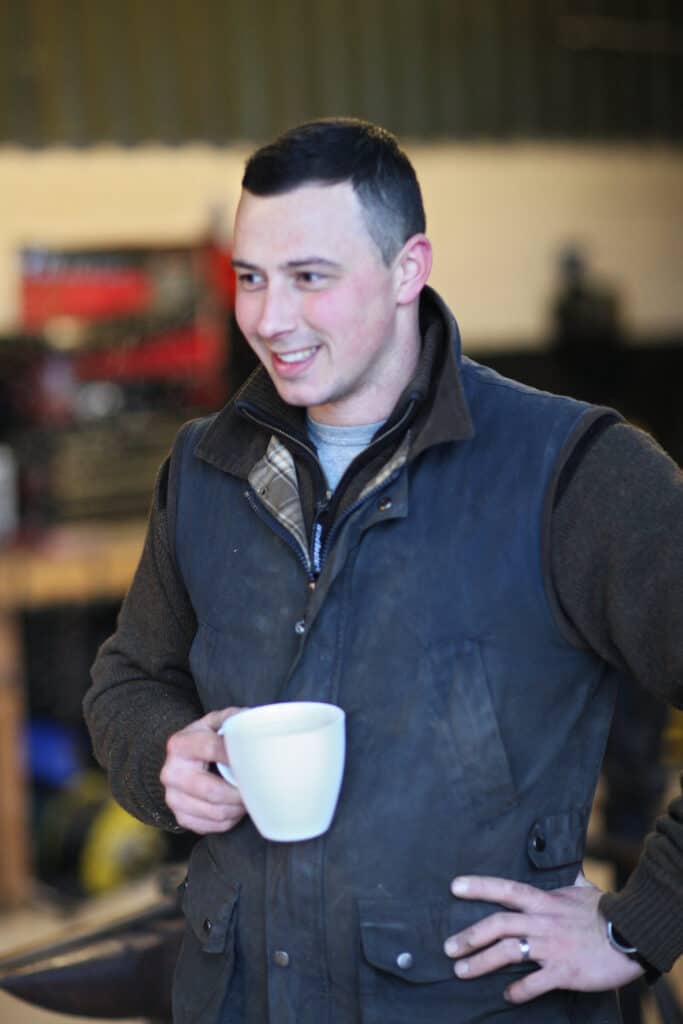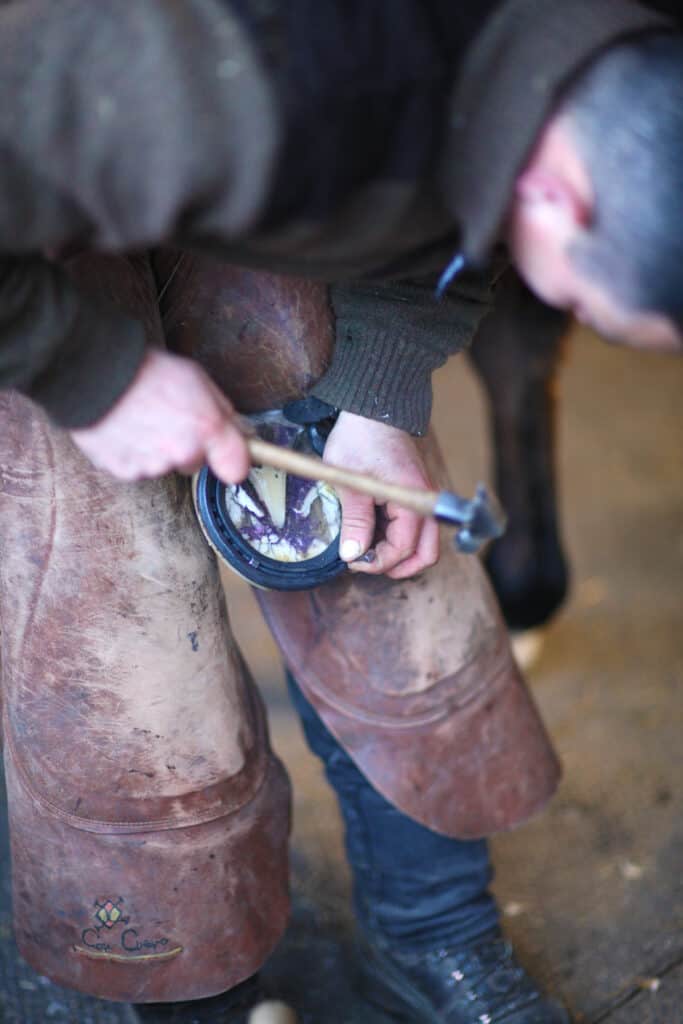Take a look at the life of Dorset farrier Sam Wilkes and you will believe horseshoes really are lucky. Tracie Beardsley reports

All images: Courtenay Hitchcock
I think I’m in Shillingstone, just outside Blandford, but either the satnav’s misled me or I’m at an American ranch. No matter – always a sucker for cowboy films, arriving at what could be the set of a Western has me swaggering like John Wayne.
There are ranch-style corrals with sandy floors and wooden railings. A beautiful stallion is whinnying in the distance. Up on the ‘mountainous’ hillsides (from where my imaginary Magnificent Seven would gallop) are smart log cabins and Pioneers luxury wooden lodges. Even these glamping rentals have names that nod to the wild west – names like Goldpanners, Ranchers and Trappers.

It might be freezing outside, but in a cosy barn are sheepskin rugs to keep your knees warm, along with pommel saddles and cowboy hats – and brilliant black and white photographs of rodeo riders on the walls. Even on a dark and dismal winter’s day, this setting is special. No wonder Dorset farrier Sam Wilkes describes it as his ‘dream place’.
Sam, 27, and his wife Yasmin moved to aptly-named ‘Loose Reins’ in 2020. ‘We were looking for land for our ten horses. Coincidentally, I used to bring my sister riding here a long time ago. After seeing it was up for sale, we just knew we had to go for it. We’d wanted to build something just like this and here it was, ready for us to move in.’
Sam runs his farriers business, Purbeck Forge Ltd, while Yasmin, a successful equestrian dressage competitor, uses the former Western-style riding school to teach dressage. Post-COVID, they’re also busy building glamping opportunities – the idyllic lodges are let for most of the year now.
And if that’s not a big enough workload, they’ve chickens, dogs, sheep, goats and 13.5 acres to tend, plus the joys of an 18-month old daughter (who already has two Shetland ponies). Multi-tasking is the answer and Sam’s adept at simultaneously walking the dogs and the Shetlands and pushing Millie in her pram!
Look back at Sam’s childhood and working with horses seems inevitable. His mum ran a riding school in Studland and as a youngster, Sam was hooked on horses. ‘I’d watch the farriers and was fascinated,’ he says.
At the age of 18, Sam was studying horse anatomy, blacksmithing and farrier skills at Moreton Morrell College in Warwickshire. ‘The two disciplines are very different,’ explains Sam. ‘Blacksmiths specialise in metalwork. Farriers specialise in horses, making horseshoes and shoeing horses. A farrier can be a blacksmith but a blacksmith can’t be a farrier.’
Sam was apprenticed to a Winchester farrier, returning to college every six months for his exams. Five years later, he achieved his DipWCF (Diploma of Worshipful Company of Farriers) and became a registered farrier. Now, with his mobile forge, Sam travels to shoe horses – from Shires to Shetlands –and occasionally trims the feet of sheep, donkeys, goats and alpacas too.

He says: ‘The animals are more relaxed if you can shoe them in their own environment.’
The equipment is high tech but the farrier’s skill has changed little since Roman times. ‘I still use nails mainly but you can glue the shoes on in certain cases. I will use factory-made horseshoes but still make some of my own.’
A boot rack and a stunning garden bench, both made out of spare horseshoes, show Sam’s creative flair. ‘As an apprentice, I used to make horseshoe ornaments and sell them for a bit of money.’
Sam works four days a week as a farrier – it was seven before he bought Loose Reins.
‘I’m looking to the long game, so I want to pace myself. It’s a very physical job and horses are powerful. I’ve had some scrapes but no serious injuries. Most farriers end up with bad backs because of the bending over.
‘This is more than a job, it’s a passion. My first client was just two years old and had awful feet. She’s now eight and competing. It’s so satisfying watching a young horse grow and know you’ve helped it.
‘Eventually I’d like to work abroad for a farrier charity such as The Flying Anvil. They send farriers to countries such as Ethiopia and India to share horse welfare skills and knowledge.’
It looks like Sam’s lucky horseshoe charm will spread further than Shillingstone.

Find Sam on Facebook: Sam Wilkes DipWCF
Sam’s in action at the Spring Countryside Show on 22nd and 23rd April at Turnpike Showground, Motcombe springcountrysideshow/
See Loose Reins here loosereins.co.uk/




